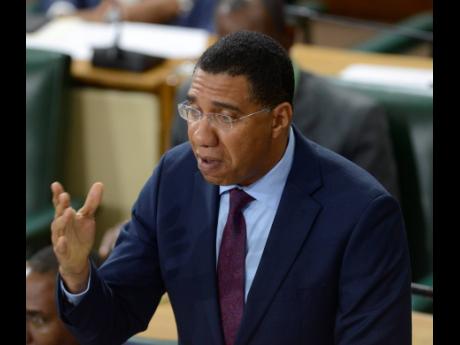More heat on Holness
Two prominent business leaders have renewed calls for Prime Minister Andrew Holness to address frontally issues surrounding his yet-to-be-cleared statutory declarations.
Private Sector Organisation of Jamaica (PSOJ) President Howard Mitchell said that Holness’ continued failure to address his long-overdue declarations could result in the erosion of confidence in the Government and Jamaica as a destination for foreign direct investment.
“We are concerned and we would at least like to know why Mr Holness has not made his declarations known. We understand that circumstances alter cases, but we believe that Government must be transparent and accountable,” Mitchell said.
He added that Holness’ failure to be cleared by the Integrity Commission could also give the impression that the leader of the country is not responding to the requirements of the law.
“We think that if there’s a difficulty in meeting that response, then the prime minster must officially deal with the Integrity Commission, to the satisfaction of the commission, and to the extent possible, let the public know the reason for the delay, when it will be rectified, and if it can’t be rectified, why not?” the outspoken PSOJ boss said.
Holness and several other serving and former parliamentarians, including Zavia Mayne, Luther Buchanan, Leslie Campbell, Ian Hayles, Ruel Reid, Arnaldo Brown, and Keith Walford, were flagged after their income, assets, and liabilities declarations were not cleared as cited in the 2017 annual report of the Integrity Commission.
squandering trust
Describing the situation as unacceptable, Jamaica Chamber of Commerce President Lloyd Distant said Holness runs the risk of squandering hard-earned trust from the public and international investors if he continues to drag his feet.
Noting that the request from the Integrity Commission must be adhered to, Distant said the prime minister, being the country’s highest elected official, has more to lose than most by his perceived reluctance to speak on the matter.
He also believes foreign investors usually seek out countries in which they believe the holders of public office have a high degree of trust.
“As a result of that, the confidence that is created in their minds around the holders of public office starts with the prime minister,” Distant said. “And while we don’t suggest that investments will be stopped because of his failure to make known to Parliament his statutory declarations, it should be understood that if it’s not resolved in a satisfactory time, that it is going to be cause for greater concern.”

